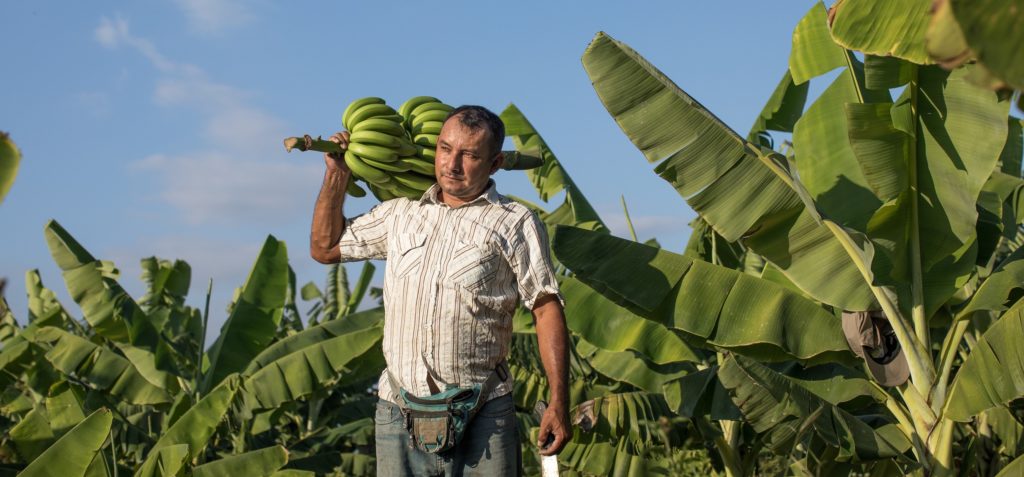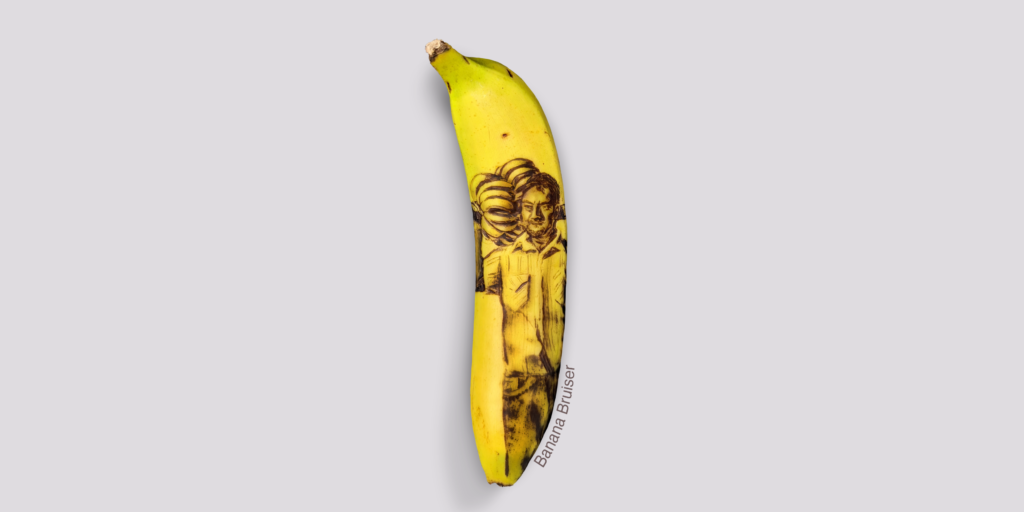Fairtrade Foundation has unveiled a creative collaboration with London-based ‘Banana Bruiser’ artist, Anna Chojnicka, who has created a unique piece of artwork in a tribute to the banana farmers and workers overseas who grow the fruit for UK consumers.
To mark the annual Banana Lovers’ Day (August 27), the Fairtrade Foundation commissioned Ms Chojnicka to create a bespoke piece of banana art, elaborately produced by bruising the skin of bananas.
The banana in question – selected from a Fairtrade-certified bunch – depicts the portrait of Peruvian banana farmer Juan Roberto, who has been growing organic Fairtrade bananas for over a decade to support his family of two children in La Noria, Peru.
The creative partnership between Fairtrade Foundation and the Banana Bruiser artist aims to highlight the hard work of banana farmers and workers in low-income countries across Latin America, the Caribbean and Africa, who are often paid low prices for their hard labour.
Anna Chojnicka, who creates one bruised banana artwork each day, said: “As someone driven by the values of social justice and sustainability, I’m delighted to collaborate with the Fairtrade Foundation to create this specially bruised banana artwork and to shine a light on the challenges facing banana farmers and workers overseas. I create art by bruising (and then eating) a banana every day, and I’m grateful for the farmers who work hard to produce them.
“When it comes to food, fairness and ethics matter – and sadly, they’re in short supply in many places. But Fairtrade means better pay and better prospects for banana growers. That’s why I use Fairtrade bananas for my artwork and it’s why I would encourage shoppers to choose Fairtrade as often as they can.
“Love the banana. Love the farmer.”
An image of the Fairtrade banana art and an accompanying video has been unveiled on the Fairtrade Foundation Instagram page today. The Foundation hopes the collaboration will encourage more businesses and shoppers to choose Fairtrade bananas, so that growers can earn fairer, higher incomes. This, it says, is vital for protecting their livelihoods, crops and communities from the damaging climate crisis and rising living, fuel and farming costs.
Anna Pierides, Senior Supply Chain and Programme Manager for Bananas at the Fairtrade Foundation said: “The bruised Fairtrade banana carefully created by Anna Chojnicka is a vivid tribute to the hard work and sacrifices made by farmers and workers overseas, who are vital to ensuring we can enjoy this much-loved fruit here in the UK.
“The banana sector is an industry where production costs continue to rise, while market prices remain painfully low, placing a heavy burden on smallholder farmers and workers. For those without the financial safety nets and benefits that Fairtrade certification offers, the prospects can be dire – particularly as the climate crisis and cost of living crises continue to bite.
“Every Fairtrade banana bought in the UK makes a significant difference to the 36,000 Fairtrade farmers and workers who grow them – and their communities. For instance, our new research findings indicate that the extra funds certified groups receive is vital to them for bringing them a step closer to living wages. This Banana Lovers Day, we encourage businesses and shoppers to choose Fairtrade bananas, so that even more banana growers can earn a decent wage, live comfortably, plan for their families’ future and enjoy the fruits of their labours.”
The Fairtrade Foundation recently commissioned a study into how the Fairtrade Premium – an additional sum that certified groups collectively invest in business or community initiatives of their choice – helps to bring banana workers in Ghana and Colombia closer to earning a living wage. Preliminary findings from the research reveal the critical role that Fairtrade Premium plays in supporting living wages.
As well as contributing to increased cash benefits, the Fairtrade Premium adds value in ways relevant to the local and regional living wage infrastructure, the study shows. This includes investment in workers’ housing, subsidised meals for workers, transport infrastructure and construction of schools and health centres. For example, on average the extra benefits generated through Fairtrade Premium for workers in Ghanaian plantations in the study is equal to US$75 per person per month, where the living wage benchmark in the region is US$257 per month.

Commenting on the benefits of Fairtrade, banana farmer Juan Roberto, whose image features in the artwork, said: “Our work is not recognised, those who consume the food do not know that the farmer has to go through many difficulties to be able to harvest. When a banana is spotless and of the best quality in a supermarket, it is the result of hard work from us, the farmers.” He added: “If there would be no Fairtrade, banana prices would be lower and we would not be economically viable. We would be bankrupt, because of the price of bananas.”
According to Fairtrade, the need for a living wage and living incomes is particularly pressing in the banana sector. Fairtrade has taken concrete steps towards closing the living wage gap for banana workers in recent years, including launching the Fairtrade Base Wage for banana workers in 2021. This is set at 70 percent of the take-home pay needed for a living wage, and is unique among certifications schemes.
Willy Paredes, a Peru-based producer representative from Fairtrade’s network of small producers and workers in Latin America and the Caribbean (CLAC), said: “The banana farmers and workers I meet work extremely hard to grow bananas. Yet many of them struggle to earn enough to keep their families afloat, due to the low prices paid for their crops.
“Climate change is already threatening their futures. Now, they are telling me that earning a decent living from bananas has become even more difficult, because of the recent sharp rise in household, transport and agricultural costs they face. I believe many banana farmers and workers would be plunged into poverty without the financial protections that Fairtrade certification offers them and their communities.”
-ENDS-
For interviews or images, contact tomilola.ajayi@fairtrade.org.uk
notes to editors
- All the Fairtrade bananas used in Anna Chojnicka’s work do not go to waste: after documenting her pieces, she eats the banana to complete the creative process. Find out more: www.bananabruiser.com
- To hear more about Juan Roberto’s story, watch the Fairtrade farmer documentary
